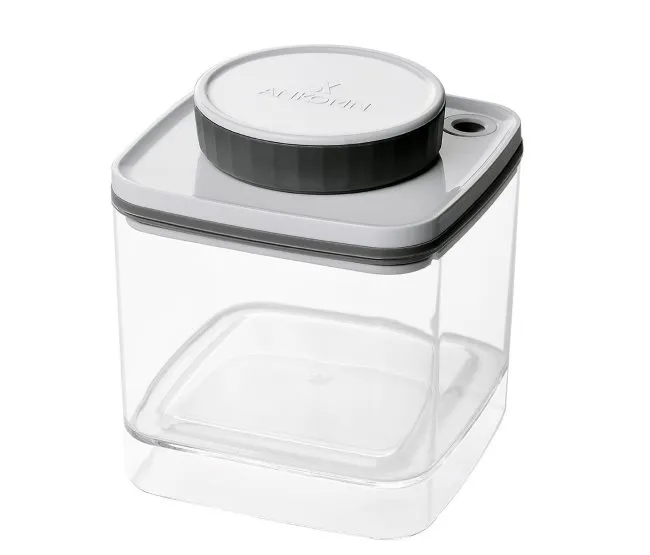
One of the most asked questions about coffee is: What is the best way to store coffee? This article will review the best ways to keep the coffee you purchase fresher and longer. We will also cover what not to do and end with product recommendations for storing coffee beans.
Buy Fresh
It must be said that no matter how well you store your coffee beans at home, if you buy older coffee, your coffee will not be at its best. Many bags of stale coffee line grocery store shelves. You’ll want to look for a roast date on the bag. Even if the bag is vacuum-sealed, time is the enemy. If you do not see a roast date, assume it is stale and find another option.
Darker roasts are less forgiving than lighter roasts. If you like darker coffee, look for coffee a few days off roast. Lighter roasts can be 1-2 weeks old. Sometimes, even 3 weeks. If you are making cold brew coffee, you can use older coffee.
Here in Seattle, I figured out that my favorite roaster made their fresh coffee delivery to stores on Friday afternoons. Guess when I timed my grocery store visit? That evening.
Whole Bean vs Ground Coffee
Because of its much greater surface area, ground coffee will go stale much faster than whole beans. Grinding your coffee at home just prior to brewing is a very important step for maximizing coffee freshness. If you can’t grind coffee at home, buying smaller amounts of coffee more frequently is your best plan.
The Enemy of Coffee Freshness
Coffee freshness has five enemies.
- Moisture
- Air
- Heat
- Light
- Depth of Roast
Moisture
The worst thing you can do is store your coffee in the refrigerator. Not only is it a moist environment, but the coffee can absorb the flavors of the food being stored in the frig.
The freezer is more complicated. Generally, coffee should be kept out of the freezer for similar reasons. However, if you have a lot of coffee you want to save, placing those beans in an airtight freezer bag is not a bad idea. Taking coffee in and out of the freezer repeatedly is not advised.
Air
Like other perishable food items, coffee begins to lose its flavor potential when exposed to air. Sealing coffee in a bag or container is one of the most important things you can do to extend the life of your coffee.
Heat
I never thought much about heat’s role in coffee freshness until a few years ago. I visited a coffee shop that kept their coffee in bags next to a window where the sun was beating down. Despite having access to the fresh coffee delivered by the roaster, the coffee there tasted stale. The coffee was fine, as I had at a different coffee shop before. The heat had destroyed the flavor.
Keep your coffee away from heat to extend its freshness.
Light
Light exposure is probably the least violated rule of coffee storage. Unless you are taking the coffee out of its bag, placing it in a glass container, and storing it in the open, you are likely fine. Just note that coffee prefers darkness.
Depth of Roast
Other coffee sites that tackle the subject of coffee storage never seem to mention the role roast level plays in the coffee freshness equation. Darker roasted coffees, regardless of how they are stored, go stale quicker than lighter roasted coffees. Coffees taken to French Roast or Italian Roast are more porous than lighter-roasted coffees.
From the article Hacking Dark Roast – Tips on Brewing a Better Bold Coffee:
When coffee is roasted well into and even beyond the second crack, the structure of the coffee bean is more fragile and porous. This greatly shortens the window of freshness. I talked with one Seattle roaster that told me a dark French roast coffee might start to taste flat in as little as four days. That is four days from roast. You can try and seal the coffee as best as you can to preserve and extend freshness, but a heavily roasted coffee will age faster.
There are three solutions for the dark roast fan:
- Make more frequent purchases of smaller amounts of coffee. Time your purchases close to the roast date.
- Shift to a medium-dark roast to extend the freshness window.
- Start the rewarding hobby of home-roasting, so you are guaranteed to get fresh coffee in the exact amounts you want. Plus, you’ll save money. All you need is a porch and an old popcorn popper. (Roasting Coffee in a Popcorn Popper)
Coffee Storage Options
Now that we know what not to do with coffee, let’s explore the options for storing it correctly.
#1 Cabinet
The simplest solution is to seal the coffee bag and place it in a cabinet as best as possible. It will be away from moisture, light, and heat.
#2 Jars, Containers
Phase two involves placing the coffee in a jar or other kitchen container and then storing it in a dark cabinet (if it is glass). I had used this method for many years, especially when I had many different home-roasting samples.
#3 Vacuum-Sealed Containers
Today, I use a vacuum-sealed container. My coffee never goes stale. The first cup of the bag tastes just as good as the last. And this is the ideal situation. Ankomn makes a vacuum-seal container that seals with a quick turn.

Ankomn Turn-N-Seal Container
Putting it All Together
To maximize coffee freshness, we will only buy fresh coffee, especially if we prefer darker roasted coffee. Ideally, we will grind the coffee just before brewing, but if we can’t, we’ll still do our best to keep the coffee fresh.
We will keep the coffee out of the refrigerator. We won’t purchase too much coffee at once to minimize the chance some will go flat. If we do buy too much coffee, we can store it in an airtight freezer-safe bag in the freezer and then move it to room-temperature storage when we are ready to consume it.
At a minimum, we will keep coffee sealed in its bag and stored in a dark cabinet. The next step is to find a jar or container to place the coffee in, eventually graduating to a vacuum-sealed solution.
Resources
Coffee Storage—Our original article dives deeper into the best way to use the freezer to store coffee.